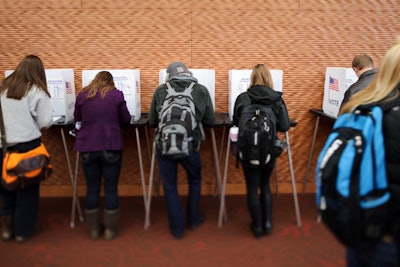 Dr. Elizabeth Bennion, professor of political science at Indiana University
Dr. Elizabeth Bennion, professor of political science at Indiana University
“Having a polling place on campus can increase student voter turnout to create a culture of voting right when they’re going to classes,” said Dr. Elizabeth Bennion, a professor of political science at Indiana University. “But you’ll see in some states that the election board will fight against that polling place on campuses or try to divide the campus into multiple districts, which dilutes the power of the student vote and confuses the student.”
Cole Riley, a 21-year-old junior at North Carolina Agricultural and Technical State University (NC A&T), faced a campus divided into two districts at the historically Black university. Riley is a voting rights activist and helped lobby to redress NC A&T’s gerrymandered campus last year. Now on top of his studies and the pandemic, he’s gearing up for another round of redistricting and voter restrictions that could impact students, particularly at HBCUs.
“I’m expecting some nonsense,” said Riley, who has lobbied to get polling sites on campus as well. “I don’t know what we’ll be able to do other than to educate students on how to vote. The trouble we’ve also had is that we’re an HBCU, so we don’t have a blind trust in our government given our history as Black voters. So, we’ll just be honest with students and say, ‘Look this is messed up, the gerrymandering and closing our voting sites, it’s all messed up.’”
Bennion broke down why this kind of redistricting can hurt college student voters.
“When you’re trying to do civic education among students, it helps to have the same candidates on the ballot to use locally, but if you’re divided into multiple districts it’s hard to understand which candidates are on their ballot,” said Bennion. “It makes civic and political engagement harder, but it also is a rather transparent approach in many cases of elected officials trying to keep their seats by diluting the power of students against their interests.”
Bennion added that one of the arguments among people in communities with large college campuses is that students are too transient to be considered real residents. They can vote absentee where they lived before enrolling in college but not where they go to college.















